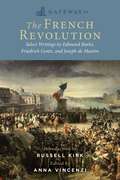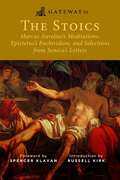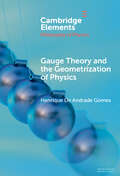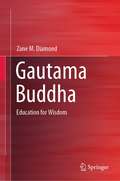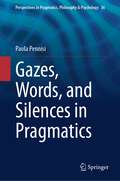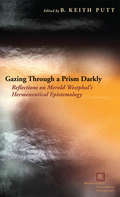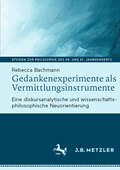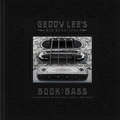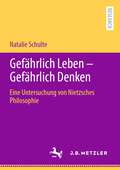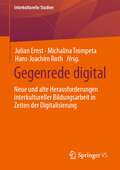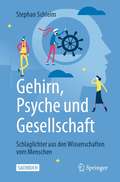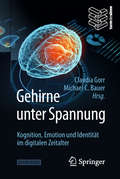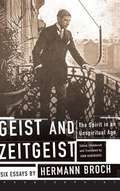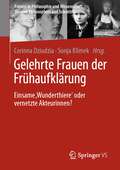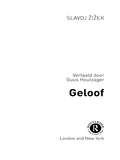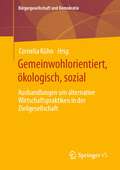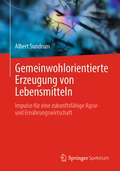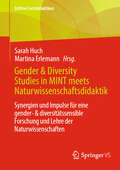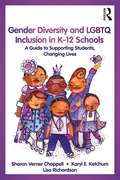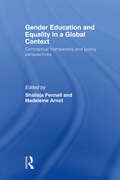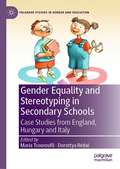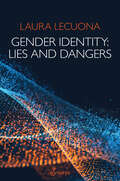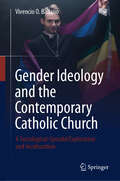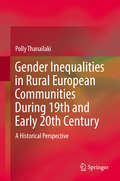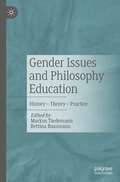- Table View
- List View
Gateway to the French Revolution: Edmund Burke's Reflections on the Revolution, Friedrich von Gentz's Revolutions Compared, and Joseph de Maistre's On God and Society
by Edmund BurkeGateway to the French Revolution features voices critical of the French Revolution and its aftershocks. Edmund Burke&’s critique of the Revolution is widely known and set into motion the development of political Conservatism. Also decrying the excesses of the Terror is Friedrich Gentz, a lesser-known Austrian diplomat who would become an architect of European peace after Napoleon&’s failed ambitions, and Joseph de Maistre, a Savoiard nobleman whose own reflections would form a current of counter-revolutionary reactionary that has continues to have implications in our contemporary world.
Gateway to the Stoics: Marcus Aurelius's Meditations, Epictetus's Enchiridion, and Selections from Seneca's Letters
by Epictetus Marcus Aurelius SenecaThe one book you need to master stoic philosophy!This classic collection, newly revised and with a foreword by classicist Spencer Klavan, includes the famed original introduction by Russell Kirk, the full text of the Meditations of Marcus Aurelius, the complete Enchiridion of Epictetus, and key selections from Seneca and Hierocles of Alexandria in one compact volume.
Gauge Theory and the Geometrisation of Physics (Elements in the Philosophy of Physics)
by Henrique De GomesThis Element is broadly about the geometrization of physics, but mostly it is about gauge theories. Gauge theories lie at the heart of modern physics: in particular, they constitute the Standard Model of particle physics. At its simplest, the idea of gauge is that nature is best described using a descriptively redundant language; the different descriptions are said to be related by a gauge symmetry. The over-arching question this Element aims to answer is: why is descriptive redundancy fruitful for physics? I will provide three inter-related answers to the question: ``Why gauge theory?'', that is: why introduce redundancies in our models of nature in the first place? The first is pragmatic, or methodological; the second is based on geometrical considerations, and the third is broadly relational.
Gautama Buddha: Education for Wisdom
by Zane M. DiamondThis book examines some of the key elements of Buddhist education theory, in particular about educating for wisdom, the ultimate goal of Buddhist education. The teachings of Gautama Buddha have endured for thousands of years carried into the present era in schools, universities, temples, personal development courses, martial arts academies and an array of Buddhist philosophical societies across the globe. Philosophically, the ideas of the Buddha have held appeal across many cultures, but less is known about the underlying educational theories and practices that shape teaching and learning within Buddhist-inspired educational contexts. The chapters outline the development of the Buddha’s teachings, his broad approach to education and their relevance in the 21st century. Subsequently, the book reviews the history of the evolution of the various schools of Buddhist thought, their teaching and learning styles and the dissemination among Asia and later also the Western countries. The book discusses education theories and devices embedded within the Buddhist teachings, examining the works found in the Tipitaka, the Buddhist canon.
Gazes, Words, and Silences in Pragmatics (Perspectives in Pragmatics, Philosophy & Psychology #36)
by Paola PennisiThis book describes the role of eye contact in human communication by investigating the relationship between the eye gaze and the development of language and pragmatic skills. The author reveals that although the need for eye contact is an innate human characteristic, neurodevelopmental disorders can have adverse outcomes and delays in language and pragmatic skills. A comparative approach compares childhood disorders that affect pragmatics in animal species that are phylogenetically related to humans with those species that are not. This text appeals to students and researchers working in pragmatics and the philosophy of language.
Gazing Through a Prism Darkly: Reflections on Merold Westphal's Hermeneutical Epistemology (Perspectives in Continental Philosophy)
by B. Keith PuttMerold Westphal has been in the foremost ranks of philosophers who proclaim a new postsecular philosophy. By articulating an epistemology sensitive to the realities of cognitive finitude and moral weakness, he defends a wisdom that begins in both humility and commitment, one that always confesses that human beings can encounter meaning and truth only as human beings, never as gods.The present volume focuses on this wisdom of humility that characterizes Westphal's thought and explores how that wisdom, expressed through the redemptive dynamic of doubt, can contribute to developing a postsecular apologetic for faith.This book can function both as an accessible introduction to Westphal for those who have not read him extensively and also as an informed critical appreciation and extension of his work for those who are more experienced readers.
Gedankenexperimente als Vermittlungsinstrumente: Eine diskursanalytische und wissenschaftsphilosophische Neuorientierung (Studien zur Philosophie des 20. und 21. Jahrhunderts)
by Rebecca BachmannGedankenexperimente weisen in der Philosophie einen widersprüchlichen Status auf: Sie werden einerseits regelmäßig entworfen und breit diskutiert, andererseits werden sie ebenso häufig kritisiert oder sogar als Methode abgelehnt. Dies liegt vor allem an der narrativen Natur ihres Szenarios. Während dieses das Herzstück eines Gedankenexperiments ist, wird es in theoretischen Auseinandersetzungen meist entweder Zentrum der Kritik am Instrument oder schlicht vernachlässigt. Diese Untersuchung setzt es sich dem entgegen zum Ziel, den epistemologischen Stellenwert des Szenarios herauszuarbeiten, um auf dieser Basis eine neue Funktion von philosophischen Gedankenexperimenten theoretisch zu konturieren. Mithilfe einer Analyse des Forschungsstandes zum Diskurs um Gedankenexperimente, wissenschaftstheoretischen Begründungen und einer Analyse der Rezeption des Geiger-Gedankenexperiments von Judith Jarvis Thomson wird eine wissenschaftstheoretische Vermittlungsfunktion von Gedankenexperimenten entwickelt.
Geddy Lee's Big Beautiful Book of Bass
by Geddy LeeRock ‘n’ Roll Hall of Famer and Rush bassist Geddy Lee celebrates rock music’s thunderous, rumbly bottom end—the bass—in this unique, lavishly illustrated, full-color compendium showcasing over two hundred rare, iconic, beautiful, and sometimes eccentric bass guitars from his extensive collection. <P><P>In this luxurious keepsake volume, Geddy Lee chronicles the fascinating history of one of rock music’s foundation instruments, the bass guitar. Written with arts journalist Daniel Richler, gorgeously photographed by Richard Sibbals, and with insight from Geddy’s trusted bass tech and curator, John "Skully" McIntosh, Geddy Lee’s Big Beautiful Book of Bass profiles over two hundred classic basses from Geddy’s extensive collection. <P><P>The book combines knowledge and observations gleaned from Geddy’s long, successful career with new and behind-the-scenes photos, ranging from his earliest days to Rush’s sold-out 40th anniversary tour in 2015, plus personal interviews with some of the world’s top bassists and collectors. <P><P>A musician and guitar freak, Geddy has acquired the magnificent bass models that have been the backbone of the world’s greatest popular music, from greats such as Paul McCartney, John Entwistle, and Jack Bruce. <P><P>The book features vintage basses from 1950 through the mid-1970s—the golden age of guitar making. <P><P>Suffused with Geddy’s intelligence, taste, and disarming wit, Geddy Lee’s Big Beautiful Book of Bass is also an entertaining look at a legend’s career on stage, in the studio, and at home. Geddy shares his views of the role of the bass guitar in his life and in the lives of the great players who’ve influenced him, revealing his passions and motivations, and ultimately broadening fans’ appreciation of his beloved instrument.
Gefährlich Leben - Gefährlich Denken: Eine Untersuchung von Nietzsches Philosophie
by Natalie SchulteNietzsche gilt als faszinierender Philosoph, der das Denken zu einer gefährlichen Sache, zu einem Abenteuer erklärt und der den/die Leser*in verlockt, sich auf das Wagnis seines Denkens einzulassen. Philosophie erscheint nicht als abstrakte Angelegenheit, sondern als eine zutiefst persönliche Auseinandersetzung, die das Leben des/der Einzelnen verwandeln soll, selbst um den Preis seiner möglichen Zerstörung. Welche Bedeutung aber hat das gefährliche Moment innerhalb von Nietzsches Philosophie für den/die Einzelne*n – und welche für die Gesellschaft? Und wie weit darf man in Selbst- und Fremdgefährdung gehen? Diesen Fragen geht die vorliegende Arbeit nach, wobei die Interpretation von Nietzsches Denken eingerahmt wird von zwei rezeptionsgeschichtlichen Untersuchungen: Von Beginn seiner Wirkung bis heute wurde Nietzsche als der gefährliche Philosoph par excellence verstanden. Inwieweit er glorifiziert, vereinnahmt oder verurteilt wird, sagt aber nicht zuletzt einiges über die Rezipierenden selbst aus und gibt Antwort auf die Frage, wieviel gefährliches Denken wir in einer Gesellschaft für zumutbar halten. Ein Einblick in die frühe und späte Nietzscherezeption zeigt dem/der Leser*in die Bandbreite an Reaktionen von Verherrlichung bis Verdammung, die Nietzsches Philosophie bis heute provoziert.
Gegenrede digital: Neue und alte Herausforderungen interkultureller Bildungsarbeit in Zeiten der Digitalisierung (Interkulturelle Studien)
by Julian Ernst Hans-Joachim Roth Michalina TrompetaDie Hoffnung, in Zeiten der Digitalisierung könnten gesellschaftliche Ungleichheitsverhältnisse und Ausgrenzungsprozesse abgebaut werden, scheint sich (bisher) nicht einzulösen: Rassistische und antidemokratische Akteur*innen propagieren ihre ideologisch durchformten Weltbilder mittels Videos mehr denn je, sogenannte Social Bots füllen und polarisieren automatisiert die Kommentarspalten in sozialen Netzwerken und Aktivist*innen wie gesellschaftlich benachteiligte Gruppen werden mittels Memes stereotypisiert, verhöhnt und angefeindet. Auf der anderen Seite bieten digitale Medien kreative und innovative Möglichkeiten der Selbstorganisation, Selbstrepräsentation und Partizipation mit dem Ziel auch der visuellen Emanzipation unterschiedlichster Communities und der Begegnung von Hate Speech: Gegenrede digital. Diskutiert werden im Band neben Möglichkeiten und Herausforderungen digitaler Medien für die Artikulation von Gegenrede auch grundlegende Fragen politisch-interkultureller Bildungsarbeit, die sich im Kontext digitaler Gegenrede stellen.
Gehirn, Psyche und Gesellschaft: Schlaglichter aus den Wissenschaften vom Menschen
by Stephan SchleimDieses Buch enthält eine Zusammenstellung von Artikeln zu aktuellen Fragen der Wissenschaften vom Menschen. Es spannt einen Bogen von der Philosophie und Psychologie bis hin zur Biologie, Hirnforschung und Medizin. Der Autor forscht und lehrt nicht nur in diesen Gebieten, sondern schreibt darüber seit über 15 Jahren für ein breites Publikum. Eine Auswahl der 33 wichtigsten Beiträge aus seinem erfolgreichen Blog MENSCHEN-BILDER (Spektrum der Wissenschaft) sind hier in überarbeiteter Form neu zusammengestellt und mit Einführungen und Ausblicken versehen. In sechs Abschnitten behandelt er Grundfragen von Neurophilosophie und -Theologie, Neuroethik, psychischen Störungen, Lebensphilosophie und sexueller Orientierung. Die Bedeutung der wissenschaftlichen Funde für Mensch und Gesellschaft steht dabei an zentraler Stelle.Für den Autor ergänzen sich die drei Sichtweisen „Gehirn, Psyche und Gesellschaft“, sodass der Mensch und sein Handeln nicht bloß als die Summe seiner neuronalen Schaltkreise verstanden werden kann. Das Buch schlägt damit auch eine Brücke zwischen Geistes-, Sozial- und Naturwissenschaften, die einander befruchten. Anhand von philosophischen Problemen und Alltagserfahrung wird deutlich, wie diese Perspektiven zusammengehören.
Gehirne unter Spannung: Kognition, Emotion und Identität im digitalen Zeitalter
by Claudia Gorr Michael C. BauerGehirne unter Spannung Die fortschreitende Digitalisierung verändert unsere Kommunikation, unsere Bildung, unser Sozialleben, nicht zuletzt unsere Wahrnehmung von uns selbst. Wie wirken sich diese Veränderungen inzwischen und zukünftig auf Gesellschaft, Familie und den Einzelnen aus? In welcher Weise beeinflussen WhatsApp, Facebook & Co. den Umgang mit Partnern, Freunden, aber auch uns fremden Netzwerk-Usern? Beschneiden soziale Medien und Algorithmen unsere Autonomie und Mündigkeit; wenn ja - wie können wir uns schützen? Auch im Bereich der Entwicklung künstlicher Intelligenz machen sich bahnbrechende Innovationen bemerkbar. Kann ein intelligentes System eigentlich Gefühle haben und was lernen wir vor allem daraus über uns selbst? Fragen wie diese stehen im Mittelpunkt dieses Buches, in dem renommierte Experten verschiedener Fachgebiete die Herausforderungen des digitalen Wandels für den Menschen beleuchten.
Geist And Zeitgeist: The Spirit In An Unspiritual Age
by John Hargraves Hermann BrochHermann Broch achieved international recognition for his brilliant use of innovative literary techniques to present the entire range of human experience, from the biological to the metaphysical. Concerned with the problem of ethical responsibility in a world with no unified system of values, he turned to literature as the appropriate form for considering those human problems not subject to rational treatment. <p><p> Late in life, Broch began questioning his artistic pursuits and turned from literature to devote himself to political theory. While he is well known and highly regarded throughout the world as a novelist, he was equally accomplished as an essayist. These six essays give us a fascinating glimpse into the mind of one of the twentieth century's most original thinkers.
Gelehrte Frauen der Frühaufklärung: Einsame ‚Wunderthiere‘ oder vernetzte Akteurinnen? (Frauen in Philosophie und Wissenschaft. Women Philosophers and Scientists)
by Corinna Dziudzia Sonja KlimekDieser Band versammelt die Beiträge einer Tagung, die im Februar 2019 mit Unterstützung des Forschungsverbunds Marbach Weimar Wolfenbüttel und der Dr. phil. Fritz Wiedemann Stiftung in der Herzog August Bibliothek in Wolfenbüttel stattfand. Ziel der interdisziplinären Veranstaltung war es, die Frühaufklärung als eine Zeitspanne sichtbar werden zu lassen, in der sich für Frauen, wenngleich teilweise nur vorübergehend, zahlreiche Tätigkeitsfelder eröffneten, sei dies als Ärztinnen, Malerinnen, Kupferstecherinnen oder Dichterinnen. Frauen führten in dieser Zeit europaweit gesellige, gelehrte und/oder musikalische Salons und betätigten sich als Mäzeninnen oder selbst als hochgeschätzte Musikerinnen und Komponistinnen. Universitäten, Akademien und Gesellschaften verliehen den gelehrten Frauen im 17. und 18. Jahrhundert Preise und sogar Doktorwürden. Darüber hinaus wurden Frauen in der Frühaufklärung als malende, kämpfende, rechnende, experimentierende, übersetzende und heilende Frauen aktiv.
Geloof (Routledge filosofie)
by Slavoj ZizekHoe kunnen we nog geloven en regels hebben in dit postmoderne tijdperk waarin naar verluidt niets is om in te geloven en geen regels zijn. De beroemde filosoof en onstuitbaar cultuurcriticus Slavoj Zizek daagt iedereen uit in dit overtuigende en adembenemende nieuwe boek.In Geloof, dat van 'cyberspace-denken' tot de paradox van het 'westerse boeddhisme' gaat, legt Zizek de vooronderstellingen bloot achter de manier waarop we gewoonlijk over geloof denken, met name in judaïsme en christendom. Door de zogenaamde authenticiteit van het religieuze geloof tegen een kritisch licht te houden en te putten uit psychoanalyse, film en filosofie, laat hij op schokkende wijze zien dat de basis van onze fundamenteelste overtuigingen minder rotsvast is dan wij denken.
Gemeinwohlorientiert, ökologisch, sozial: Aushandlungen um alternative Wirtschaftspraktiken in der Zivilgesellschaft (Bürgergesellschaft und Demokratie)
by Cornelia KühnDer Klimawandel gefährdet die Existenzgrundlage zukünftiger Generationen. Damit zukunftsfähige und klimaverträgliche Gesellschaften entstehen können, sind tiefgreifende Änderungen von Produktionsprozessen, aber auch von Konsummustern und Lebensstilen notwendig. In diesem Sammelband werden Möglichkeiten und Grenzen der Ausweitung alternativer Wirtschafts- und Lebensformen erkundet. Dabei werden kleine Unternehmen und nachhaltige Bildungsinitiativen genauso betrachtet wie Regionen, Berufszweige und Großunternehmen auf ihrem Weg in eine nachhaltige Zukunft.
Gemeinwohlorientierte Erzeugung von Lebensmitteln: Impulse für eine zukunftsfähige Agrar- und Ernährungswirtschaft
by Albert SundrumLebensmittel sind Mittel zum Leben. Die Art und Weise ihrer Erzeugung betrifft uns alle. Weitgehend unbemerkt von der öffentlichen Wahrnehmung hat sich in den vergangenen Jahrzehnten ein System der Agrar- und Ernährungsindustrie entwickelt, das uns mit einer Fülle von Nahrungsmitteln mit zu niedrigen Preisen versorgt.Die unerwünschten Nebenwirkungen und externen Kosten dieses Systems wurden jedoch lange Zeit ausgeblendet. Enorme Umwelt- und Klimabelastungen, Verlust der Biodiversität, tierschutzrelevante Missstände und ein anhaltendes Hofsterben beschreiben nur unzulänglich das wahre Ausmaß an Schadwirkungen. Im Interesse des Gemeinwohls können diese nicht länger hingenommen werden. Allerdings stehen die Komplexität der Sachverhalte und vielfältige Partikularinteressen einfachen Lösungen entgegen.Dieses Fachbuch liefert eine umfassende systemische Analyse aus sehr unterschiedlichen Perspektiven und erläutert, wie es zu dieser Entwicklung hat kommen können. Es wird aufgezeigt, welche grundlegenden Veränderungen in allen Bereichen erforderlich sind, um über eine evidenzbasierte Qualitätserzeugung einen Ausweg aus dem zerstörerischen Streben nach Kostenminimierung zu finden. Fachkräfte der Agrar- und Ernährungsindustrie und der involvierten wissenschaftlichen Fachdisziplinen, einschließlich der Veterinärmedizin, sowie Entscheidungsträger in politischen Institutionen, Berufsverbänden und NGOs können dieses Wissen für eine zukunftsfähige Neugestaltung des Lebensmittelsektors nutzen.
Gender & Diversity Studies in MINT meets Naturwissenschaftsdidaktik: Synergien und Impulse für eine gender- & diversitätssensible Forschung und Lehre der Naturwissenschaften (Edition Fachdidaktiken)
by Martina Erlemann Sarah HuchGender und dessen Zusammenwirken mit weiteren Diversity-Dimensionen wie etwa soziale Herkunft, ein (zugeschriebener) Migrationshintergrund oder sexuelle Orientierung stehen an Hochschulen verstärkt im Fokus. Gefordert sind dabei auch gender- und diversitysensible Ausrichtungen der Forschung und Lehre der MINT-Fächer sowie der hochschulischen Lehramtsausbildung für MINT. Welche inhaltliche Relevanz haben Gender- und Diversity-Aspekte in Fachkultur, Forschungsinhalten sowie im Wissenschaftsverständnis der Naturwissenschaften? Wie strukturieren Geschlecht und andere soziale Differenzkategorien die Forschung? Wie kann eine Gender- und Diversity-Kompetenzen vermittelnde Lehrer*innenbildung aussehen?Auf diese Fragen geben die interdisziplinären Beiträge der Wissenschaftler*innen, etwa aus Physik, Biologie, Medizin, Feminist Science & Technology Studies sowie die naturwissenschaftlichen Fachdidaktiken Antworten. Ansätze sowie Wissensbestände der Gender & Diversity Studies in MINT werden mit den gender- und diversityausgerichteten Naturwissenschaftsdidaktiken zusammengeführt. Mit vielfältigen Anregungen ermutigen sie zu einer gender- und diversityorientierten Ausrichtung der (eigenen) Forschung und Lehre.
Gender Diversity and LGBTQ Inclusion in K-12 Schools: A Guide to Supporting Students, Changing Lives
by Sharon Verner Chappell Karyl E. Ketchum Lisa RichardsonThis exploration of effective practices to support lesbian, gay, bisexual, transgender, queer (LGBTQ) and gender-diverse students in elementary, middle, and high school contexts focuses on curriculum, pedagogy, and school environment. Narratives and artwork from the field are framed by sociocultural and critical theory as well as research-based elaboration on the issues discussed. Applications of antidiscrimination law and policy, as well as learning skills like creativity, collaboration, and critical thinking help teachers tackle some of the most significant educational challenges of our time. The stories of real-world practices offer encouragement for building inclusive environments and enhancing social-emotional relationships among youth, families, and schools. Gender Diversity and LGBTQ Inclusion in K-12 Schools provides a helpful roadmap for educators hoping to create safe and empowering spaces for LGBTQ and gender-diverse students and families.
Gender Education and Equality in a Global Context: Conceptual Frameworks and Policy Perspectives
by Shailaja Fennell Madeleine ArnotThe Millennium Development Goals aim to achieve basic education for all by 2015. But can such global agendas address national and local gender inequalities and will they empower women through education? This thought-provoking book offers an opportunity to engage critically with existing and emergent conceptual frameworks and methodological approaches to this global debate. It is divided into three sections that: reconceptualise the definitions of gender equality used by various social scientific disciplines, international organisations and policy makers; illustrate the methodologies used to collect the voices of young men and women and their teachers telling stories of their success in lifting the burdens of poverty and negotiating traditional gender relations; trace the impact of global gender agendas on national education policies, such as citizenship education, poverty reduction strategies, and feminist activism around adult women’s learning. Gender Education and Equality in a Global Context is an invaluable introduction to the range of conceptual frameworks and innovative research methods that address issues of gender education and development.
Gender Equality and Stereotyping in Secondary Schools: Case Studies from England, Hungary and Italy (Palgrave Studies in Gender and Education)
by Maria Tsouroufli Dorottya RédaiThis book explores gender stereotyping and gender inequalities in secondary education in England, Hungary and Italy. The authors highlight the importance of addressing student and teacher attitudes if long-term changes in mindset are desired, as well as the underlying stereotypes that persist and linger in these educational contexts. Promoting a whole-school culture change approach, this book explores views of gender stereotypes from teachers and students concerning subject and career choices, as well as collaborative work with teachers, experts and NGOs in implementing and evaluating gender equality charters. Drawing on extensive research, this book employs an intersectional and cross-country approach: while the authors acknowledge the challenges and opportunities of researching gender equality frameworks across different countries, ultimately these link to the UN Sustainable Development goal of gender equality.
Gender Identity: Lies and Dangers
by Laura LecuonaThousands of pages of books, millions of characters in tweets and hundreds of blogs have been devoted to explaining the distinction between sex and gender, but far from clarifying anything, bewilderment for ordinary people is only growing.The concept of gender is central to a vaguely progressive-looking set of ideas based on the maxim that people possess a so-called ‘ gender identity' . The real problem arises when this nebulous concept, bandied about with different and even incompatible meanings by different groups, is used as a prop to introduce policies that mark a huge setback for the rights of women and girls. The general public, watching the controversy from the sidelines, is confused by conflicting claims about whose rights are being infringed.In this incisive book, Laura Lecuona sets the record straight by reviewing the origin of the current uses of the key term gender and exploring the main theories of transgenderism. She discusses what lies behind the claims about pronoun usage and warns about the consequences of promoting the recognition of so-called transgender children. She points out the collateral damage arising from this activism, from the perpetuation of sexist roles to limitations on freedom of speech. She dares to confront the accusations of transphobia that often inhibit those who question the foundations of this financially-driven and increasingly dominant ideology and shows the devastating effects transactivism is having on women, both socially and politically. Gender Identity: Lies and Dangers is essential reading for the urgently needed conversation we need to have about whose interests are being served with the advancement of transgender ideology and what this means for women' s sex-based rights.
Gender Ideology and the Contemporary Catholic Church: A Sociological-Synodal Exploration and Inculturation
by Vivencio O. BallanoThis book sociologically investigates the contemporary Catholic Church’s stance on gender diversity and “gender ideology” and explores ways to adapt the social science perspectives on sex, gender, and gender fluidity in the Church’s moral teachings, applying Pope Francis’s inductive synodal theology. Using the sociological theories on gender, moral panics, and morality and drawing on secondary literature, media reports, and church documents, it specifically unpacks the “gender ideology’s” alleged grave threats to humanity, family, children, and human dignity as moral panics as well as examines the Catholic morality of gender-enhancement treatment and sex change. Ultimately, this book aims to inculturate or adapt the contemporary sociological gender theory and research in the Catholic Church’s moral doctrines as a synodal response to the “signs of the times.” It therefore appeals to church authorities, moral theologians, LGBTQI leaders, as well as scholars and students of sociology, religion, and gender studies.
Gender Inequalities in Rural European Communities During 19th and Early 20th Century: A Historical Perspective
by Polly ThanailakiThis book provides an overview of women’s opportunities for schooling, their social activities, and the social biases they faced in rural communities in Greece, Italy and parts of the Balkans during the 19th and early 20th century. It examines such topics as female illiteracy, the efforts of women-protestant missionaries to expand knowledge through Protestantism, the prejudice against education for women, the socio-economic context, the roles women fulfilled, and the structure of the patriarchal family. The book approaches these issues from the perspective of pedagogy and social history. The fundamental questions discussed by the book are: How was female education viewed by the country folk? What was the role of women in the private and the public sphere? How did peasant women respond to the challenges of the ‘modern’ world? Were they free to express their feelings and ambitions? In what way? Were they happy?
Gender Issues and Philosophy Education: History – Theory – Practice
by Markus Tiedemann Bettina BussmannWith this volume a gap in the philosophical didactics is closed. A historical section initially introduces authors who have determined the gender discourse and at the same time a critical discussion. This is followed by an overview of sexual and gender diversity, its basics and differentiations. Theoretical papers then deal with the relevance of gender research for the self-understanding of philosophical education. Finally, practice-specific contributions demonstrate how topics and aspects of the gender problem can be prepared for different age groups and school types. With 2 lesson plans.
